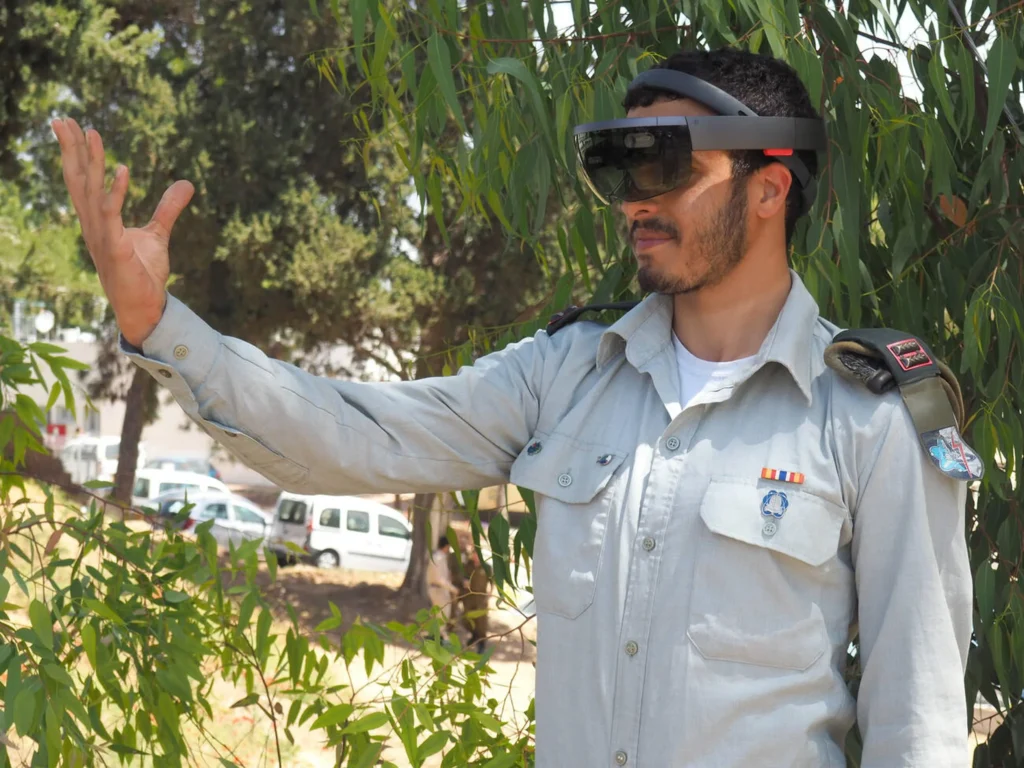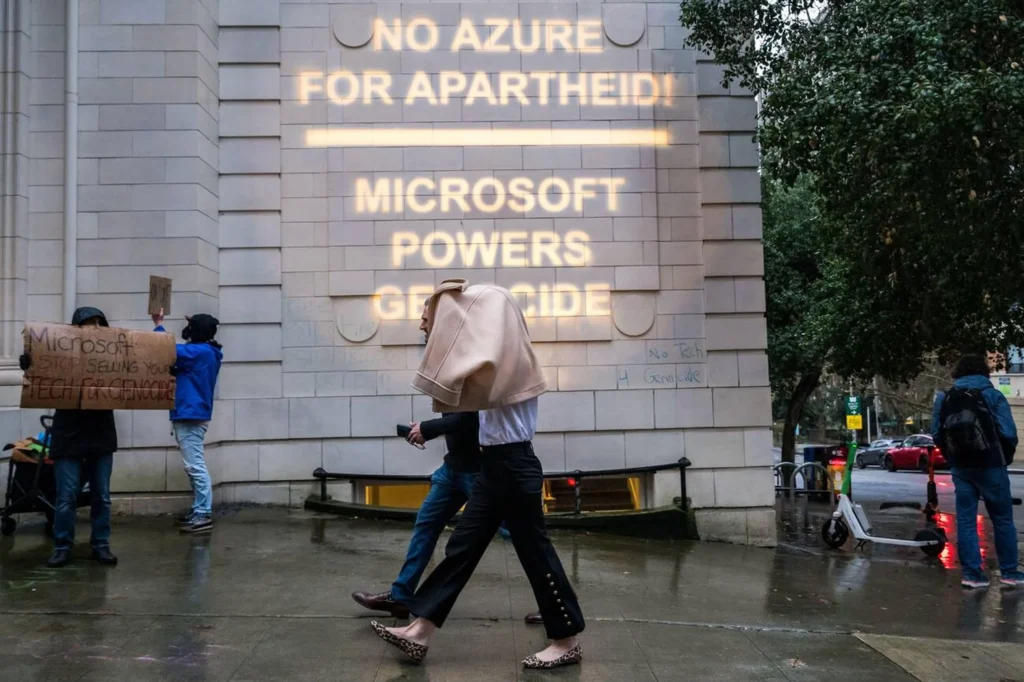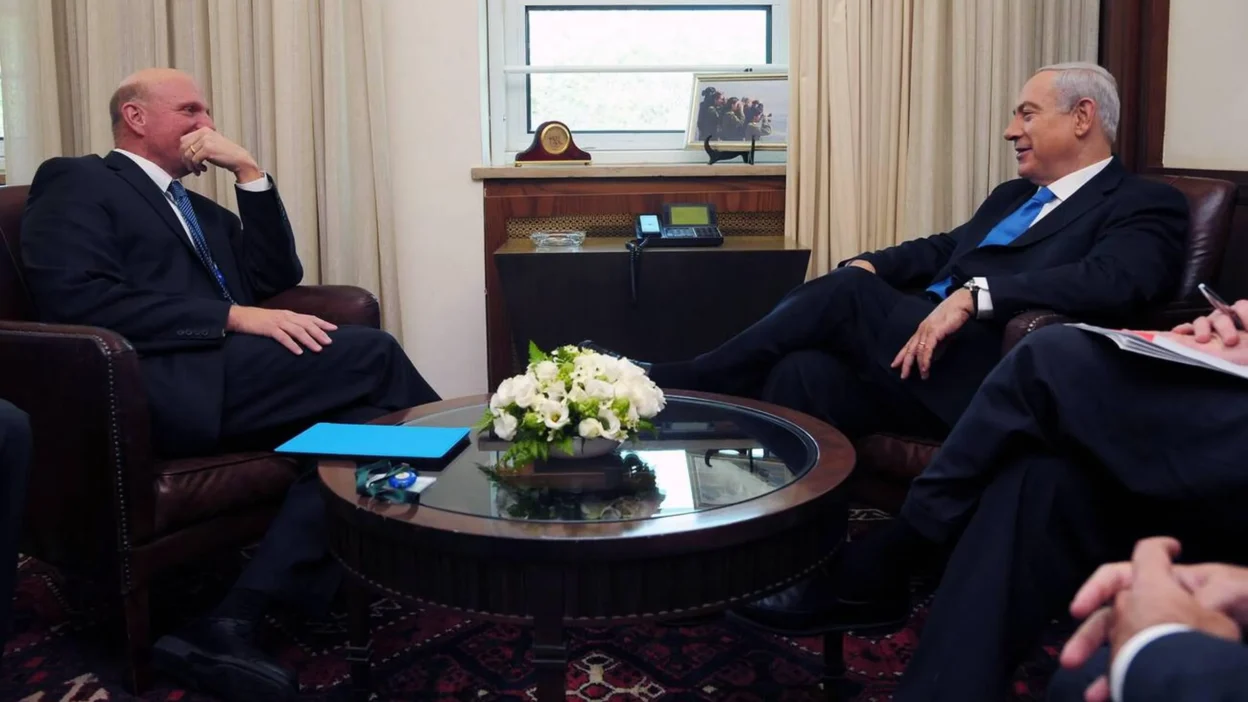In today’s digital age, the intersection of technology and geopolitics has never been more apparent. As we step into 2025, a growing number of voices are raising concerns about how major tech companies—like Microsoft—are complicit in supporting military operations, particularly those of the Israeli occupation forces. This article delves into the ethical dilemmas surrounding Microsoft’s role in aiding Israel’s military campaigns, highlights the courageous actions of employees like Ibtihal Abou Saad , and discusses what this means for corporate accountability in the tech industry.
The Incident That Sparked Global Attention
On April 4, 2025, thousands gathered at Microsoft’s headquarters in Washington to celebrate the company’s 50th anniversary. Amid speeches highlighting technological achievements, an unexpected interruption occurred. Moroccan software engineer Ibtihal Abou Saad took the stage during a presentation by Mustafa Suleiman, The company’s CEO of Artificial Intelligence. Addressing the audience in English, she stated:
“50,000 people have died in Gaza. Microsoft’s hands are stained with blood, and it is complicit in genocide.”
Despite being cut off by Suleiman, who thanked her for her protest but continued his speech, Ibtihal persisted. She urged him to stop using artificial intelligence (AI) to support mass atrocities in Gaza, saying:
“Shame on you, Mustafa. You’re Syrian; you’re profiting from this war. Stop using AI to support genocide in Gaza.”
Security personnel eventually escorted her out of the venue. This incident reignited global scrutiny over Microsoft’s deep ties with the Israeli occupation army.
Microsoft’s Role in Supporting Israeli Military Operations
Microsoft isn’t merely a service provider for the Israeli government—it has become a critical security partner. The company offers advanced cloud computing services through its Azure platform, enabling Israeli forces to monitor, target, and kill Palestinians. According to leaked documents cited by investigative outlets like Drop Site News, Microsoft’s infrastructure supports activities ranging from data storage and translation to drone surveillance and live footage analysis.
Key Statistics on Microsoft’s Support for Israel’s Military
The following table summarizes key data points about Microsoft’s involvement:
| Metric | Details |
|---|---|
| Storage Capacity Increase | 155% surge in storage dedicated to Israeli occupation forces (June 2023–April 2024). |
| Peak Usage | Before Rafah attack in May 2024. |
| Data Stored on Servers | Over13.6 petabytes (13,600 terabytes)between October 2023 and July 2024. |
| Server Usage During Aggression | Increased bytwo-thirdswithin the first two months of Israel’s assault on Gaza. |
Specific Examples of Microsoft’s Support for Israeli Military Units
Microsoft provides critical support to several specialized units within the Israeli occupation army, including:
- Unit 8200 : The intelligence unit responsible for cyber operations and data collection.
- Mazav : The encryption and cybersecurity center.
- Mamram : The technological infrastructure division.
- Tikshuv : The directorate of computers and information technology.
- Lotem : A division focused on enhancing operational technology in the army.
These units rely heavily on Microsoft Azure for cloud storage, data analysis, and target identification, enabling them to carry out military operations in Gaza, the West Bank, and Lebanon. According to leaked documents, Microsoft employees facilitate these operations by providing Israeli officers with cloud storage, backups, translations, and data analysis—including mobile phone calls and footage from surveillance cameras—to help them identify targets and bomb them.

Confirmation from Israeli Military Officials and the Associated Press
In July 2024, Rachel Dombensky, a colonel in the Israeli occupation army and head of the military’s information systems unit (Mamram), made a startling admission at an IT conference. She revealed that major American tech giants like Microsoft, Amazon, and Google were actively assisting Israel in:
- Mass surveillance of Gaza’s residents.
- Identifying targets for bombing.
- Capturing live footage of the area using drones.
This statement was corroborated by an investigation published by the Associated Press in February 2024. The AP report highlighted the following findings:
- The Israeli occupation army’s reliance on Microsoft Azure services increased significantly in March 2024 compared to the week before October 7, 2023.
- Between October 2023 and July 2024, the amount of data stored by Israel on Microsoft servers grew substantially, reaching over 13.6 petabytes (13,600 terabytes) .
- Within the first two months of Israel’s aggression on Gaza, usage of Microsoft’s computing servers rose by about two-thirds .
OpenAI’s Controversial Partnership with Microsoft
One of the most alarming aspects of this collaboration involves OpenAI, the creator of ChatGPT. Microsoft invested 1 billion in OpenAI in 2019 and later increased total investments to nearly 14 billion, making it one of OpenAI’s largest investors. As part of this agreement, OpenAI integrated its AI tools into Microsoft Azure, which is available in various locations, including Israel. This integration enabled the Israeli occupation army to leverage tools like GPT-4 for targeting Palestinians—a clear violation of OpenAI’s usage policies, which explicitly prohibit using its products for weapons development, property destruction, or harming civilians.
OpenAI’s Ethical Backtracking
In January 2024, OpenAI made significant changes to its policies regarding the use of its AI models. It removed warnings against using its models in military and combat fields and replaced them with vague language allowing their use for matters related to “national security.” This shift effectively opened the door for continued cooperation with both the Israeli occupation army and the U.S. Department of Defense, raising serious ethical concerns about the misuse of advanced AI technologies.
Microsoft’s Biased Donation Policies
Microsoft demonstrated blatant bias in its corporate social responsibility programs. While encouraging employees to donate to extremist Israeli organizations by matching their contributions up to $15,000 annually, the company removed UNRWA —the agency providing vital aid to Palestinians in Gaza—from its list of eligible institutions in its matching donation program. This move not only highlights Microsoft’s complicity in supporting Israeli aggression but also alienated many employees who protested against the company’s unethical stance.
Employee Protests and Retaliation
Unsurprisingly, Microsoft’s involvement in these operations hasn’t gone unnoticed within the company itself. Many employees have spoken out against their employer’s unethical practices. Below is a summary of key incidents involving employee protests:
Timeline of Employee Protests Against Microsoft
| Date | Event |
|---|---|
| October 2023 | Two Egyptian engineers,Abdu MuhammadandHossam Nasser, fired after organizing protests against Microsoft’s support for Israel. Their campaign,No Azure for Apartheid, aimed to expose Microsoft’s complicity in human rights violations. |
| April 4, 2025 | Moroccan engineerIbtihal Abou Saadinterrupted a presentation by Mustafa Suleiman, accusing Microsoft of complicity in genocide. She was escorted out of the venue. |
| February 2025 | Five Microsoft employees protested during a staff meeting attended by CEO Satya Nadella. They wore T-shirts bearing the question:“Azure Code Kills Kids, Satya?”Security removed them from the meeting. |
| Same Day (February 2025) | American-Indian engineerVanya Agrawalinterrupted a panel featuring Satya Nadella, Bill Gates, and Steve Ballmer. She accused Microsoft’s technology of killing 50,000 Palestinians and condemned executives for celebrating “at the expense of Palestinian blood.” Vanya later resigned. |
Expanded Details on Employee Protests and Retaliation
In addition to firing employees like Abdu Muhammad and Hossam Nasser, Microsoft took drastic measures to silence dissenting voices. For instance:
- After Vanya Agrawal and Ibtihal Abou Saad protested, their access to company accounts was blocked entirely.
- During a staff meeting in February 2025, five employees wore T-shirts with the slogan “Azure Code Kills Kids, Satya?” Security promptly ejected them from the meeting to prevent further disruption.
These actions demonstrate Microsoft’s willingness to suppress internal criticism and retaliate against whistleblowers.

Vanya Agrawal’s Powerful Resignation Letter
In her resignation letter, Vanya Agrawal addressed all Microsoft employees, including CEO Satya Nadella and AI division head Mustafa Suleiman. She recounted witnessing the genocide committed by Israel against Palestinians since 1948 and condemned Microsoft’s role in enabling these atrocities. Here’s an excerpt from her letter:
“I joined this company a year and a half ago while witnessing the genocide Israel is committing against Palestinians, which began in 1948. I’ve seen the suffering of Palestinians amid systematic Israeli human rights violations, including indiscriminate mass bombings and the targeting of schools and hospitals. As I write this, Israel has violated the ceasefire agreement in Gaza and resumed its genocidal actions. Just recently, it was revealed that Israel killed 15 medics and aid workers in Gaza, executing them one by one before burying them in the sand—a horrific war crime.”
Vanya specifically referenced a $133 million contract revealed by the Associated Press, which exposed Microsoft’s collaboration with the Israeli occupation army. Her letter resonated deeply with hundreds of employees, sparking widespread support before the company intervened to restrict interactions with it.
Why Should You Care?
The implications of Microsoft’s actions extend far beyond geopolitics—they reflect broader questions about corporate responsibility in the tech sector. By prioritizing profit over ethics, companies like Microsoft risk normalizing the use of cutting-edge technologies for destructive purposes.
Moreover, this issue underscores the importance of holding corporations accountable. Whether you’re a consumer, investor, or employee, your voice matters. Supporting initiatives that demand transparency and ethical conduct can drive meaningful change.
Conclusion: What Can Be Done?
If you were in Ibtihal Abou Saad’s shoes—or any of the other whistleblowers—would you take a stand despite knowing the potential consequences? These brave individuals remind us that silence often perpetuates injustice.
As consumers, we must advocate for stricter regulations governing tech companies’ involvement in military operations. Additionally, supporting grassroots movements calling for divestment from firms complicit in human rights abuses can amplify pressure on corporations to act responsibly.
Read Also : The Financial Order of Operations: Your Step-by-Step Guide to Financial Freedom



